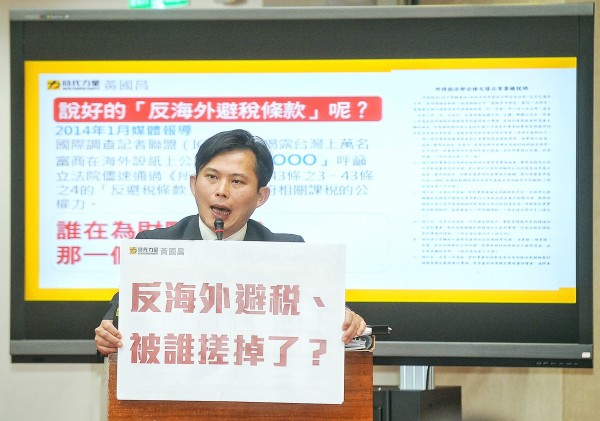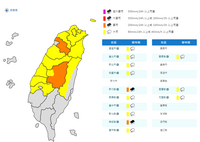《TAIPEI TIMES 焦點》 DPP, NPP each propose tax evasion measures

New Power Party Legislator Huang Kuo-chang yesterday accuses the Chinese Nationalist Party (KMT) of blocking a 2012 draft amendment of the Income Tax Act against overseas tax sheltering during a legislative meeting. Photo: Liu Hsin-de, Taipei Times
PANAMA PAPERS: The DPP said the KMT had blocked such amendments in 2012, while Tsai Ing-wen’s brother denied any wrongdoing after he was named in the leak
By Abraham Gerber, Alison Hsiao and Crystal Hsu / Staff reporters
The Democratic Progressive Party (DPP) and the New Power Party (NPP) caucuses held separate news conferences yesterday proposing to amend the Income Tax Act (所得稅法) to curb tax evasions in the wake of the “Panama Papers” revelations.
The DPP caucus said it is to propose amendments that would add “anti-tax-evasion clauses” to the law as one of the party’s priority bills in this legislative session.
It added that the Executive Yuan had in 2012 proposed amendments to the act, aiming to introduce regulations for taxing profit-seeking enterprises based on internationally recognized rules regulating “controlled foreign corporations,” but the draft had failed to receive a positive response in the legislature.
The DPP accused the Chinese Nationalist Party (KMT) caucus of blocking the amendments in the past by referring the bill to further cross-caucus negotiations, which had stalled its passage.
New Power Party Chairman Huang Kuo-chang (黃國昌) also said it would propose amendments to target tax avoidance.
“We have to push for new articles targeting overseas tax avoidance, because some corporations earn a tonne of money, but end up paying very little in taxes,” Huang said, adding that corporations used financial gimmickry to run up losses at home while registering profits abroad.
The party’s amendment would mandate that firms controlled domestically would be taxed in accordance with full domestic rates, even if they were officially registered abroad.
The “Panama Papers” purport to outline how Panama-based law firm Mossack Fonseca has assisted individuals and enterprises to evade financial oversight and taxation. The firm reportedly had at least 16,785 Taiwanese clients, with a full list to be published next month.
The NPP is also to propose amendments to the Act Governing the Exercise of Legislative Power (立法院職權行使法) to more closely specify the confirmation process for central government officials.
“After [DPP president-elect] Tsai Ing-wen (蔡英文) takes office on May 20, there will gradually be a series of nominations to the Control Yuan and Council of Grand Justices. We feel that before this takes place there should be new reform measures enacted to guarantee the quality of legislative review during the confirmation process,” NPP Legislator Hsu Yung-ming (徐永明) said.
Amendments advocated by the party would require signed balloting on all nominations, as well as requiring that public hearings be held, the nominees be questioned individually on their views on public policies and social issues, and at least two months to be spent on review.
While officials within the Executive Yuan can be appointed directly by the president, nominations of top officials in the Judicial Yuan, Control Yuan and Examination Yuan require legislative consent.
KMT Legislator-at-large William Tseng (曾銘宗), who is also the former Financial Supervisory Commission chairman, said the KMT caucus had called for cross-caucus negotiations for the amendment because the cross-strait taxation agreement — which would be a supporting measure to the amendment — had been nonexistent, and since the agreement has now been signed, the KMT caucus would support the direction of the anti-tax-evasion cause.
Meanwhile, the Ministry of Finance yesterday said it is to work with the International Consortium of Investigative Journalists (ICIJ) to investigate potential violations of tax codes by Taiwanese individuals and companies in connection with the Panama Papers.
The ministry is to set up a special task force right away and cooperate with ICIJ in decoding documents involving more than 16,000 Taiwanese companies and individuals who might have used offshore accounts to cover up tax evasion, money laundering and other irregular activities, Minister of Finance Chang Sheng-ford (張盛和) told the legislature’s Finance Committee.
“The ministry is serious about the probe this time and will track down irregularities, if there are any,” Chang said after lawmakers questioned his resolve.
KMT lawmakers in 2013 staved off an anti-tax evasion bill on concerns it could have estranged Taiwanese businesspeople based in China, even though the Finance Committee had approved the bill.
The ministry is to submit the bill to the Cabinet again today and the elections of new lawmakers in January should help facilitate the legislative process, Chang said.
A successful probe requires a legal mechanism and information sharing pacts with foreign countries involved, he said.
The bill can arrive in the legislature next week and become law by the end of this session if lawmakers give the go-ahead, he said.
Offshore financial dealings are not illegal in themselves, but can be used to hide assets from tax authorities, launder the proceeds of criminal activities or conceal misappropriated or politically inconvenient wealth.
In related developments, an older brother of Tsai was named in the so-called Panama Papers as setting up an offshore company in 2008, his lawyer said yesterday, adding that he had done nothing illegal.
However, the news prompted criticism from Tsai’s political opponents, who called for a full explanation.
Tsai’s brother, Tsai Ying-yang (蔡瀛陽), set up the offshore firm in 2008 at the recommendation of a foreign private banking adviser on personal investments, his lawyer, Lien Yuan-lung (連元龍), told Reuters, declining to elaborate.
“He lost 30 percent of the investment in the first year, so he closed the contract with the bank immediately,” Lien said by telephone. “He was not involved in money laundering, hiding the Tsai family’s wealth overseas, evading tax or anything illegal.”
Additional reporting by Reuters
新聞來源:TAIPEI TIMES













